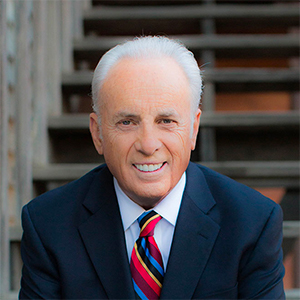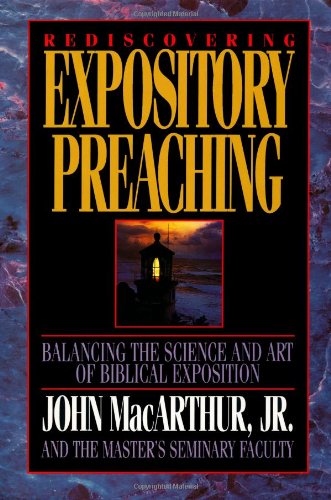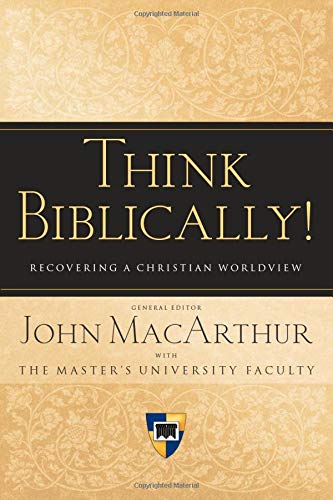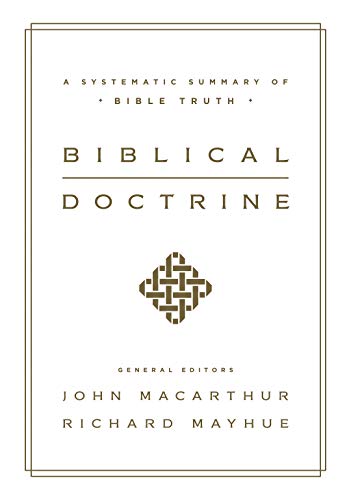
Quotes by John MacArthur
There’s a good and vital reason Paul said, “Lay hands suddenly on no man” (1 Tim. 5:22). The biblical qualifications for elders are all characteristics of godliness and giftedness that must be proven over time. A man may instinctively know how to make a good first impression. He superficially appears to be keen-thinking, knowledgeable, mature, or supremely gifted as a teacher. But he could actually have serious character flaws that would disqualify him from eldership, and these sometimes become plainly evident only through long-term patterns of behavior. It is vital therefore that church leaders “first be proved; then let them use the office” (1 Tim. 3:10).
Think about it this way: Christians who worry believe God can redeem them, break the shackles of Satan, take them from hell to heaven, put them into His kingdom, and give them eternal life, but just don’t think He can get them through the next couple of days. That is pretty ridiculous, isn’t it? That we can believe God for the greater gift and then stumble and not believe Him for the lesser one reveals an embarrassing lack of faith.
A Worried Christian: This article originally appeared (http://www.gty.org/resources/articles/A112/a-worried-christian) at www.gty.org. © 1969-2008. Grace to You. All rights reserved. Used by permission.
Worry strikes a blow at the person and character of God.
A Worried Christian: This article originally appeared (http://www.gty.org/resources/articles/A112/a-worried-christian) at www.gty.org. © 1969-2008. Grace to You. All rights reserved. Used by permission.
Worry is needless because of God’s bounty, senseless because of God’s promise, useless because of its impotence to do anything productive, and faithless because it is characteristic of unbelievers.
A Worried Christian: This article originally appeared (http://www.gty.org/resources/articles/A112/a-worried-christian) at www.gty.org. © 1969-2008. Grace to You. All rights reserved. Used by permission.
Don’t worry about the future. Even though it will have its share of problems, they have a way of working themselves out at the time. Just deal with them as they come, for there’s no way to solve them in advance. Providing for tomorrow is good, but worrying about tomorrow is sin because God is the God of tomorrow just like He is the God of today [Mt. 6:24].
A Worried Christian: This article originally appeared (http://www.gty.org/resources/articles/A112/a-worried-christian) at www.gty.org. © 1969-2008. Grace to You. All rights reserved. Used by permission.
God gives us His grace in the hour we need it. If we worry about the future now, we double our pain without having the grace to deal with it.
A Worried Christian: This article originally appeared (http://www.gty.org/resources/articles/A112/a-worried-christian) at www.gty.org. © 1969-2008. Grace to You. All rights reserved. Used by permission.
Don’t push yourself into the future and forfeit the day’s joy over an anticipated tomorrow that may never happen.
A Worried Christian: This article originally appeared (http://www.gty.org/resources/articles/A112/a-worried-christian) at www.gty.org. © 1969-2008. Grace to You. All rights reserved. Used by permission.
Anything added to grace destroys it just as surely as does anything taken from it. When law – even God’s own law – is added to grace, His grace ceases to be grace.
Forgiveness breaks the bitter chains of pride, self-pity and vengeance that lead to despair, alienation, broken relationships and loss of joy.
If Christ paid the penalty for everyone’s sins, how could God sentence people to hell for sins that Christ bore the punishment for?
Christian joy is not a giddy, superficial happiness that can be devastated by illness, economic difficulties, broken relationships, or the countless other vicissitudes and disappointments of life. Instead, it flows from the deep, unshakable confidence that God is eternally in control of every aspect of life for the good of His beloved children – a confidence rooted in the knowledge of His Word. God’s character, the saving work of Christ, the sanctifying work of the Holy Spirit, divine providence, spiritual blessings, the promise of future glory, answered prayer and Christian fellowship all cause the believer to rejoice.
It should come as no surprise of the God who supernaturally created the universe should choose at times to supernaturally intervene in it.
Without [the resurrection], [Jesus’] death becomes the heroic death of a noble martyr, the pathetic death of a madman, or the execution of a fraud.
A Christian is not one who simply buys “fire insurance,” who signs up just to avoid an unpleasant after life. A Christian…repeatedly, is one whose faith expresses itself in submission and obedience. A Christian is one who follows Christ, one who is committed unquestionably to Christ as Lord and Savior, one who desires to please God. His basic aim is to be in every way a disciple of Jesus Christ. When he fails, he seeks forgiveness and wants to move forward. This is his spirit and his direction.
The Gospel According to Jesus, © John MacArthur, 1988, p. 197. Get this book!
No child has ever been born into the world by its own will or plan. Its conception, gestation, and birth are completely out of its consciousness and control. It is merely the passive recipient of the will and action of it parents. Just as certainly, no person wills, much less creates, a new spiritual nature within himself.
What does it mean to believe in Christ? It means more than accepting and affirming the truth of who He is – God in human flesh – and believing what He says. Real faith results in obedience… True faith is never seen as passive – it is always obedient.
The Gospel According to Jesus, © John MacArthur, 1988, p. 46, 32. Get this book!
Salvation by faith does not eliminate good works per se. It does away with works that are the result of human effort alone (Ephesians 2:8). It abolishes any attempt to merit God’s favor by our works (Ephesians 2:9). But it does not deter God’s foreordained purpose that our walk of faith should be characterized by good works (Ephesians 2:10).
The Gospel According to Jesus, © John MacArthur, 1988, p. 33. Get this book!
Forsaking oneself for Christ’s sake is not an optional step of discipleship subsequent to conversion; it is the sine qua non of saving faith.
The Gospel According to Jesus, © John MacArthur, 1988, p. 135. Get this book!
The modern definition of faith eliminates repentance, erases the moral elements of believing, obviates the work of God in the sinner’s heart, and makes an ongoing trust in the Lord optional. Far from championing the truth that human works have no place in salvation, modern easy-believism has made faith itself a wholly human work, a fragile, temporary attribute that may or may not endure.
The Gospel According to Jesus, © John MacArthur, 1988, p. 172. Get this book!
Scripture needs no updating, editing, or refining. Whatever time or culture you live in, it is eternally relevant. It needs no help in that regard. It is pure, sinless, inerrant truth; it is enduring. It is God’s revelation for every generation. It was written by the omniscient Spirit of God, who is infinitely more sophisticated than anyone who dares stand in judgment on Scripture’s relevancy for our society, and infinitely wiser than all the best philosophers, analysts, and psychologists who pass like a childhood parade into irrelevancy.
Truth in a World of Theory from Our Sufficiency in Christ, 1991, Crossway Books, a division of Good News Publishers, Wheaton Illinois 60187, www.crosswaybooks.org. p. 85. Get this book!
When Jesus said, “take up your cross” to them, they thought of a cruel instrument of torture and death. They thought of dying in the most agonizing method known to man. They thought of poor, condemned criminals hanging on crosses by the roadside. Doubtless they had seen men executed in that fashion. They understood He was calling them to die for Him. They knew He was asking them to make the ultimate sacrifice, to surrender to Him as Lord in every sense.
The Gospel According to Jesus, © John MacArthur, 1988, p. 201. Get this book!
When we come to Jesus for salvation, we come to the One who is Lord over all. Any message omitting this truth cannot be called the gospel according to Jesus. It is a crippled message that presents a savior who is not Lord, a redeemer who does not demonstrate authority over sin, a weakened, sickly messiah who cannot command those he rescues.
The Gospel According to Jesus, © John MacArthur, 1988, p. 209-210. Get this book!
Understanding Bible prophecy encourages in two unique ways. First, it serves as a reminder that God controls history. When, you read from the pages of Scripture how He keeps His promises, your faith is strengthened…By reflecting on the fulfilled promises of the past, you can find great comfort as you look toward the future. Second, understanding God’s promises for the future provides a solid foundation to which you can anchor your hope—a sturdy shield with which you can deflect your doubts and fears about tomorrow…When you reflect on God’s plans and promises for you and for the world, you can face the future without fear.
The gospel Jesus proclaimed was a call to discipleship, a call to follow Him in submissive obedience, not just a plea to make a decision or pray a prayer. Jesus’ message liberated people from the bondage of their sin while it confronted and condemned hypocrisy. It was an offer of eternal life and forgiveness for repentant sinners, but at the same time it was a rebuke to outwardly religious people whose lives were devoid of true righteousness. It put sinners on notice that they must turn from sin and embrace God’s righteousness. It was in every sense good news, yet it was anything but easy-believism.
The Gospel According to Jesus, © John MacArthur, 1988, p. 21. Get this book!
The gospel according to Jesus explicitly and unequivocally rules out easy-believism. To make all of our Lord’s difficult demands apply only to a higher class of Christians blunts the force of His entire message. It makes room for a cheap and meaningless faith – a faith that may be exercised with absolutely no impact on the fleshly life of sin. That is not saving faith.
The Gospel According to Jesus, © John MacArthur, 1988, p. 31. Get this book!
The modern definition of faith eliminates repentance, erases the moral elements of believing, obviates the work of God in the sinner’s heart, and makes an ongoing trust in the Lord optional. Far from championing the truth that human works have no place in salvation, modern easy-believism has made faith itself a wholly human work, a fragile, temporary attribute that may or may not endure.
The Gospel According to Jesus, © John MacArthur, 1988, p. 172. Get this book!
When the apostle Paul wrote to the Ephesian Christians [Eph. 6], he was not suggesting that they view their conflict with the powers of darkness as a battle whose outcome still hung in the balance. He was telling them they needed to “be strong in the Lord, and in the strength of His might” (v. 10, emphasis added); to “stand firm” (vv. 11, 13); to use the spiritual armor – truth, righteousness, the gospel of peace, faith, salvation, and God’s Word – to resist the schemes of the devil. They were to fight from a position of victory, not out of fear that Satan might make them toast.
Spiritual Warfare: Who’s After Whom? from Our Sufficiency in Christ, 1991, Crossway Books, a division of Good News Publishers, Wheaton Illinois 60187, www.crosswaybooks.org. p. 215. Get this book!
Job’s story demolishes the notion that we can avoid Satan’s attacks if we’re sufficiently strong, or skilled enough, or trained in how to wage war against Satan. No one was more spiritually fit than Job. Yet God allowed Satan to ravage him anyway – and there was nothing Job could do about it. Job finally prevailed in the face of Satan’s merciless assault, not because he found some secret way to beat the devil, not because he rebuked him or ordered him to desist, but because God was in control all along. He knew how much Job could bear. And He would not permit Satan to cross that boundary (1 Cor. 10:13). When Satan reached that limit God stopped him and his attacks ended.
Spiritual Warfare: Who’s After Whom? from Our Sufficiency in Christ, 1991, Crossway Books, a division of Good News Publishers, Wheaton Illinois 60187, www.crosswaybooks.org. p. 228. Get this book!
Winning against Satan is not a question of claiming some kind of imagined authority over him; we simply need to pursue righteousness, avoid sin, and stand firm in the truth [1 Tim. 1:18-19; James 4:7; 1 Pet. 5:9].
Spiritual Warfare: Who’s After Whom? from Our Sufficiency in Christ, 1991, Crossway Books, a division of Good News Publishers, Wheaton Illinois 60187, www.crosswaybooks.org. p. 234. Get this book!
You might be interested to learn that there is no illustration in the entire Bible of anyone casting demons out of a believer. The only people who ever legitimately cast out demons were Christ and the apostles. All the demon-possessed people they dealt with were unbelievers. Furthermore, they usually cast out demons totally apart from the will of the unbeliever. Jesus and the Twelve were exercising the gift of miracles. They were authenticating messianic and apostolic credentials, not establishing a pattern for us to follow.
Spiritual Warfare: Who’s After Whom? from Our Sufficiency in Christ, 1991, Crossway Books, a division of Good News Publishers, Wheaton Illinois 60187, www.crosswaybooks.org. p. 235. Get this book!
As Christians, we find complete sufficiency in Christ and His provisions for our needs. There’s no such thing as an incomplete or deficient Christian. Our Savior’s divine power has granted to us everything pertaining to life and godliness. Human wisdom offers nothing to augment that. Every Christian receives all he and she needs at the moment of salvation. Each one must grow and mature, but no necessary resource is missing. There’s no need to search for something more.
Preface from Our Sufficiency in Christ, 1991, Crossway Books, a division of Good News Publishers, Wheaton Illinois 60187, www.crosswaybooks.org. p. 18. Get this book!
Where can we get reliable answers for life’s hardest questions? Our all-sufficient Savior has not left us without ample spiritual resources. His perfect wisdom is available through His Word. Comfort, assurance, understanding, and power are ours through the ministry of His indwelling Spirit. All of that is amplified by loving ministry from gifted people who operate in the community of believers. And it all works together to assure that each believer has perfect “abundance for every good deed” (2 Cor. 9:8).
Psychological Sanctification? from Our Sufficiency in Christ, 1991, Crossway Books, a division of Good News Publishers, Wheaton Illinois 60187, www.crosswaybooks.org. p. 111. Get this book!
We do not “make” Christ Lord; He is Lord! Those who will not receive Him as Lord are guilty of rejecting Him. “Faith” that rejects His sovereign authority is really unbelief. Conversely, acknowledging His lordship is no more a human work than repentance (cf. 2 Timothy 2:26) or faith itself (cf. Ephesians 2:8-9). In fact, it is an important element of divinely produced saving faith, not something added to faith.
The Gospel According to Jesus, © John MacArthur, 1988, p. 28. Get this book!
A Christian is not one who simply buys “fire insurance,” who signs up just to avoid an unpleasant after life. A Christian…repeatedly, is one whose faith expresses itself in submission and obedience. A Christian is one who follows Christ, one who is committed unquestionably to Christ as Lord and Savior, one who desires to please God. His basic aim is to be in every way a disciple of Jesus Christ. When he fails, he seeks forgiveness and wants to move forward. This is his spirit and his direction.
The Gospel According to Jesus, © John MacArthur, 1988, p. 197. Get this book!
In the process of striving to fulfill our needs and satisfy our desires, the church has slipped into a philosophy of “Christian humanism” that is flawed with self-love, self-esteem, self-fulfillment, and self-glory. There appears to be scant concern about worshiping our glorious God on His terms. So-called worship seems little more than some liturgy (high or low) equated with stained-glass windows, organ music, or emotion-filled songs and prayers. If the bulletin didn’t say “Worship Service,” maybe we wouldn’t know what we were supposed to be doing. And that reflects the absence of a worshiping life- of which a Sunday service is to be only a corporate overflow.
Apostles were chosen by God to work in the founding and forming of the church, after which time apostleship ceased. When all the apostles had died, the office of apostle no longer existed. They were selected, sent and empowered by God for that period in the history of the church, which was over when their lives were over. As the human founders and foundation of the church, the apostles had particular purposes and responsibilities.
In Christ’s day the world was filled with intellectuals and influential people. There were celebrated philosophers in Athens, unsurpassed scholars in Alexandria, the most powerful political leaders the world had ever known in Rome, and some of the most meticulous rabbis of all time in and around Jerusalem. Christ bypassed them all and called simple, crude, unknown, and uneducated fishermen from Galilee to be His disciples.
Six biblical reasons may be given as to why the apostolic office is not for today:
1. The church was founded upon the apostles (Eph. 2:20)… Their role was to give grounding, support, direction – to provide the underpinning for a fledgling church. They were the church’s founders. That role was fulfilled by them and by definition can never be repeated.
2. Apostles were eyewitnesses to the resurrection (1 Cor. 9:1)… There is no trustworthy evidence that (Jesus) has appeared to anyone since the close of the apostolic era.
3. Apostles were chosen personally by Jesus Christ (Mt. 10:1-4).
4. Apostles were authenticated by miraculous signs (Ac. 3:3-11; 5:15-16; 9:36-42; 20:6-12; 28:1-6)… No such miracles were ever performed – even in the apostolic era – by anyone other than the apostles and those commissioned by them.
5. Apostles had absolute authority (Jude 17)… When the apostles spoke, there was no discussion.
6. Apostles have an eternal and unique place of honor (Rev. 21:14).
I have always been fascinated with the lives of the twelve apostles. Who isn’t? The personality types of these men are familiar to us. They are just like us, and they are like other people we know. They are approachable. They are real and living characters we can identify with. Their faults and foibles, as well as their triumphs and endearing features, are chronicled in some of the most fascinating accounts of the Bible. These are men we want to know. That’s because they were perfectly ordinary men in every way. Not one of them was renowned for scholarship or great erudition. They had no track record as orators or theologians. In fact, they were outsiders as far as the religious establishment of Jesus’ day was concerned. They were not outstanding because of any natural talents or intellectual abilities. On the contrary, they were all too prone to mistakes, misstatements, wrong attitudes, lapses of faith, and bitter failure – no one more so than the leader of the group, Peter. Even Jesus remarked that they were slow learners and somewhat spiritually dense (Luke 24:25).
Yet with all their faults and character flaws – as remarkably ordinary as they were – these men carried on a ministry after Jesus’ ascension that left an indelible impact on the world. Their ministry continues to influence us even today. God graciously empowered and used these men to inaugurate the spread of the gospel message and to turn the world upside down (Acts 17:6). Ordinary men – people like you and me – became the instruments by which Christ’s message was carried to the ends of the earth. No wonder they are such fascinating characters.
Satan may even attempt to convince us that our shortcomings render us useless to God and to His church. But Christ’s choice of the apostles testifies to the fact that God can use the unworthy and the unqualified. He can use nobodies. They turned the world upside down, these twelve (Acts 17:6). It was not because they had extraordinary talents, unusual intellectual abilities, powerful political influence, or some special social status. They turned the world upside down because God worked in them to do it.
Why twelve? Why not eight? Why not twenty-four? The number twelve was filled with symbolic importance. There were twelve tribes in Israel. But Israel was apostate. The Judaism of Jesus’ time represented a corruption of the faith of the Old Testament. Israel had abandoned divine grace in favor of works-religion. Their religion was legalistic. It was shot through with hypocrisy, self-righteous works, man-made regulations, and meaningless ceremonies. It was heretical. It was based on physical descent from Abraham rather than the faith of Abraham. In choosing twelve apostles, Christ was in effect appointing new leadership for the new covenant. And the apostles represented the new leaders of the true Israel of God – consisting of people who believed the gospel and were following the faith of Abraham (cf. Romans 4:16). In other words, the twelve apostles symbolized judgment against the twelve tribes of Old Testament Israel.
Nothing in Scripture teaches that the filling of the Spirit is accompanied by ecstatic experiences or external signs. To be sure, being filled with the Spirit does bring the believer tremendous exhilaration and joy, but the New Testament epistles reveal that being filled with the Spirit brings forth the fruit of the Spirit, not the gifts of the Spirit.
Churches, mission agencies, schools and other Christian organizations that have tried to maintain unity by not confronting Charismatic influence and thus allowing it to come in and never be dealt with ultimately will all have to sacrifice their non-Charismatic position or split the organization. It does not bring unity, it brings the exact opposite because inevitably, you have the haves, the Charismatics who feel they’ve reached a higher level, and the have-nots and you have pitted two theologies against each other. One gives in or it splits.
Demanding sensational proof is not evidence of faith but of doubt. To long for the visible sign, the big miracle, the dramatic proof is nothing but masked unbelief. It is the farthest thing from faith.
Any sensationalism inevitably is frustrated by the law of diminishing returns. People are never satisfied. They always want one more sign, one more miracle, one more show. To have maintained His influence over the people by the use of miracles, Jesus would have had to produce greater and greater sensations. Because the natural, carnal heart can never be satisfied, this year’s miracle would have become next year’s bore. His followers would only have been lovers of sensation, not lovers of God.
Philosophy claims to be true but is utterly deceitful, like a fisherman who captures his unwitting prey by concealing a deadly hook within a tasty morsel of food. The fish thinks it’s getting a meal but becomes one instead. Similarly, those who embrace a human philosophy about God or man might think they’re getting truth, but instead they get empty deception, which can lead to eternal damnation.
The Quest for Something More from Our Sufficiency in Christ, 1991, Crossway Books, a division of Good News Publishers, Wheaton Illinois 60187, www.crosswaybooks.org. p. 172-173. Get this book!
Pragmatism is quickly replacing supernaturalism in many churches. It is an attempt to achieve spiritual objectives by human methodology rather than supernatural power. Its primary criterion is external success. It will employ whatever method draws a crowd and stimulates the desired response. Its underlying presuppositions are that the church can accomplish spiritual goals by fleshly means, and that the power of God’s Word alone is not sufficient to break through a sinner’s blindness and hardness of heart.
Resurrecting and Old Heresy from Our Sufficiency in Christ, 1991, Crossway Books, a division of Good News Publishers, Wheaton Illinois 60187, www.crosswaybooks.org. p. 32. Get this book!
Biblically, eternal life speaks not only of the promise of life in the age to come, but also of the quality of life that is characteristic of people who live in that age. It signifies quality as much as duration (cf. John 17:3). It is not just living forever; eternal life is being alive to the realm where God dwells. It is walking with the living God in an unending communion.
The Gospel According to Jesus, © John MacArthur, 1988, p. 80. Get this book!
The object of saving faith is not a creed, not a church, not a pastor, not a set of rituals or ceremonies. Jesus is the object of saving faith.
The Gospel According to Jesus, © John MacArthur, 1988, p. 112. Get this book!
Works are not necessary to earn salvation. But true salvation wrought by God will not fail to produce the good works that are its fruit (cf. Matthew 7:17).
The Gospel According to Jesus, © John MacArthur, 1988, p. 33. Get this book!
Salvation by faith does not eliminate good works per se. It does away with works that are the result of human effort alone (Ephesians 2:8). It abolishes any attempt to merit God’s favor by our works (Ephesians 2:9). But it does not deter God’s foreordained purpose that our walk of faith should be characterized by good works (Ephesians 2:10).
The Gospel According to Jesus, © John MacArthur, 1988, p. 33. Get this book!
Our ideas of evangelism cannot indict Jesus; rather, He must judge contemporary methods of evangelism. Modern evangelicalism is preoccupied with decisions, statistics, aisle-walking, gimmicks, prefabricated presentations, pitches, emotional manipulation, and even intimidation. Its message is a cacophony of easy-believism and simplistic appeals. Unbelievers are told that if they invite Jesus into their hearts, accept Him as personal Savior, or believe the facts of the gospel, that’s all there is to it. The aftermath is appalling failure, as seen in the lives of multitudes who have professed faith in Christ with no consequent impact of their behavior. Who knows how many people are deluded into believing they are saved when they are not?
The Gospel According to Jesus, © John MacArthur, 1988, p. 79. Get this book!
No evangelism that omits the message of repentance can properly be called the gospel, for sinners cannot come to Jesus Christ apart from a radical change of heart, mind, and will. That demands a spiritual crisis leading to a complete turnaround and ultimately a wholesale transformation. It is the only kind of conversion Scripture recognizes.
The Gospel According to Jesus, © John MacArthur, 1988, p. 167. Get this book!
Since Scripture imparts salvation, effective evangelism depends on the faithful proclamation of the Word. God will prepare the soil and bring forth the fruit. We must be faithful to plant the seed.
Religious Hedonism in Our Sufficiency in Christ, 1991, Crossway Books, a division of Good News Publishers, Wheaton Illinois 60187, www.crosswaybooks.org. p. 164. Get this book!
Whenever a religious movement has tried to rid the world of paganism, it is the true church that has suffered the most. Foxe’s Book of Martyrs records that most of those slaughtered for their faith throughout church history have been put to death by misguided zealots claiming to represent God. The Inquisition was responsible for the deaths of untold numbers of Christians, killed because they held God’s Word as a higher authority than the teachings of church leaders.
The Gospel According to Jesus, © John MacArthur, 1988, p. 132. Get this book!
The more you focus on yourself, the more distracted you will be from the proper path. The more you know Him and commune with Him, the more the Spirit will make you like Him. The more you are like Him, the better you will understand His utter sufficiency for all of life’s difficulties. And that is the only way to know real satisfaction.
Religious Hedonism in Our Sufficiency in Christ, 1991, Crossway Books, a division of Good News Publishers, Wheaton Illinois 60187, www.crosswaybooks.org. p. 157. Get this book!
Teaching theology to a heathen will not bring him to faith in Christ. He may learn the evangelical vocabulary and verbally affirm the truth. He may accept the truth of a list of gospel facts. But without a divine miracle to open his blind eyes and give him a new heart, he will only be a theologically informed pagan, not a Christian.
The Gospel According to Jesus, © John MacArthur, 1988, p. 74. Get this book!
Repentance as Jesus characterized it…involves a recognition of one’s utter sinfulness and a turning from self and sin to God (cf. 1 Thessalonians 1:9). Far from being a human work, it is the inevitable result of God’s work in a human heart. And it always represents the end of any human attempt to earn God’s favor. It is much more than a mere change of mind – it involves a complete change of heart, attitude, interest, and direction. It is a conversion in every sense of the word.
The Gospel According to Jesus, © John MacArthur, 1988, p. 32. Get this book!
Repentance is NOT:
1. Merely being ashamed or sorry over sin, although genuine repentance always involves an element of remorse.
2. Merely a human work. It is, like every element of redemption, a sovereignly bestowed gift of God.
3. A pre-salvation attempt to set one’s life in order. It is a command to recognize one’s lawlessness and hate it, to turn one’s back on it and flee to Christ, embracing Him with wholehearted devotion.
Excerpted from: The Gospel According to Jesus, © John MacArthur, 1988, p. 163. Get this book!
To some measure even unbelievers benefit from God’s grace. Theologians call that “common grace” because it is common to all mankind. Common grace is God’s continual care for all creation, providing for His creatures’ needs. Through common grace God restrains humanity from utter debauchery and maintains order and some sense of beauty, morality, and goodness in society’s consciousness.
Sufficient Grace from Our Sufficiency in Christ, 1991, Crossway Books, a division of Good News Publishers, Wheaton Illinois 60187, www.crosswaybooks.org. p. 243. Get this book!
Once a congregation sees Scripture as less than the final, complete, infallible authority for faith and practice, it has opened the doors to theological chaos. Anyone can claim to be speaking God’s revelation – and almost anything can be passed off as divinely revealed truth.
Charismatic Chaos, Zondervan, © John MacArthur, 1992, p. 66, www.zondervan.com. Get this book!
Christ’s kingdom people are not to reflect the world but they are to influence the world; they are to be in it but not of it.
Scripture, because of its absolute clarity, brings understanding where there is ignorance, order where there is confusion, and light where there is spiritual and moral darkness. It stands in stark contrast to the muddled musings of unredeemed men, who themselves are blind and unable to discern truth or live righteously. God’s Word clearly reveals the blessed, hopeful truth they can never see.
Truth in a World of Theory from Our Sufficiency in Christ, 1991, Crossway Books, a division of Good News Publishers, Wheaton Illinois 60187, www.crosswaybooks.org. p. 84.
Job’s story demolishes the notion that we can avoid Satan’s attacks if we’re sufficiently strong, or skilled enough, or trained in how to wage war against Satan. No one was more spiritually fit than Job. Yet God allowed Satan to ravage him anyway – and there was nothing Job could do about it. Job finally prevailed in the face of Satan’s merciless assault, not because he found some secret way to beat the devil, not because he rebuked him or ordered him to desist, but because God was in control all along. He knew how much Job could bear. And He would not permit Satan to cross that boundary (1 Cor. 10:13). When Satan reached that limit God stopped him and his attacks ended.
Spiritual Warfare: Who’s After Whom? from Our Sufficiency in Christ, 1991, Crossway Books, a division of Good News Publishers, Wheaton Illinois 60187, www.crosswaybooks.org. p. 228. Get this book!
Christlikeness is the substance of spiritual dedication.
A Balance of Faith and Effort from Our Sufficiency in Christ, 1991, Crossway Books, a division of Good News Publishers, Wheaton Illinois 60187, www.crosswaybooks.org. p. 201. Get this book!
[Quietism] asserts that the Christian is to be passive (quiet) in the process of spiritual growth and let God do everything. According to quietist teaching, the Christian must exert no energy or effort in the process whatsoever, for feeble human effort only hinders the working of God’s power. Quietists believe Christians must simply surrender fully to the Holy Spirit (also called “yielding,” “dying to self,” “crucifying oneself,” “mortifying the flesh,” or “placing one’s life on the altar”). The Spirit then moves in and lives a life of victory through us, and Christ literally replaces us (“it is no longer I who lives, but Christ lives in me” – Gal. 2:20). In its extreme variety, quietism is a spiritual passivism in which God becomes wholly responsible for the believer’s behavior, and the believer feels he must never exert personal effort to pursue righteous living. Quietists have popularized the phrases, “Let go and let God,” and “I can’t; He can.”
A Balance of Faith and Effort from Our Sufficiency in Christ, 1991, Crossway Books, a division of Good News Publishers, Wheaton Illinois 60187, www.crosswaybooks.org. p. 195. Get this book!
Worship services in many churches today are like a merry-go-round. You drop a token in the collection box; it’s good for a ride. There’s music and lots of motion up and down. The ride is carefully timed and seldom varies in length. Lots of good feelings are generated, and it is the one ride you can be sure will never be the least bit threatening or challenging. But though you spend the whole time feeling as if you’re moving forward, you get off exactly where you got on.
Religious Hedonism in Our Sufficiency in Christ, 1991, Crossway Books, a division of Good News Publishers, Wheaton Illinois 60187, www.crosswaybooks.org. p. 151. Get this book!
The Bible teaches clearly that the evidence of God’s work in a life is the inevitable fruit of transformed behavior (1 John 3:10). Faith that does not result in righteous living is dead and cannot save (James 2:14-17). Professing Christians utterly lacking the fruit of true righteousness will find no biblical basis for assurance they are saved (1 John 2:4). Real salvation is not only justification. It cannot be isolated from regeneration, sanctification, and ultimately glorification. Salvation is an ongoing process as much as it is a past event. It is the work of God through which we are “conformed to the image of His Son” (Romans 8:29, cf. Romans 13:11). Genuine assurance comes from seeing the Holy Spirit’s transforming work in one’s life, not from clinging to the memory of some experience.
The Gospel According to Jesus, © John MacArthur, 1988, p. 23. Get this book!
There is perfect unity in divine revelation, and the way of salvation revealed in the Old Testament was the same as salvation after Christ’s work on the cross. Salvation was never a reward for human works; it has always been a gift of grace for repentant sinners, made possible by the work of Christ… In the Old Testament salvation was not a payoff for those who observed the law; it was a gift to those who humbly and by faith sought redemption from their sin.
The Gospel According to Jesus, © John MacArthur, 1988, p. 42. Get this book!
Precisely because it is so powerful, the Bible has always had its enemies. Unbelievers challenge its credibility. Skeptics question its accuracy. Moral revisionists depreciate its precepts. Religious liberals dispute its supernatural character. Cultists twist its meaning.
Bible-Believing Doubters from Our Sufficiency in Christ, 1991, Crossway Books, a division of Good News Publishers, Wheaton Illinois 60187, www.crosswaybooks.org. p. 117. Get this book!
What does it mean to believe in Christ? It means more than accepting and affirming the truth of who He is – God in human flesh – and believing what He says. Real faith results in obedience… True faith is never seen as passive – it is always obedient.
The Gospel According to Jesus, © John MacArthur, 1988, p. 46, 32. Get this book!
The Bible teaches clearly that the evidence of God’s work in a life is the inevitable fruit of transformed behavior (1 John 3:10). Faith that does not result in righteous living is dead and cannot save (James 2:14-17). Professing Christians utterly lacking the fruit of true righteousness will find no biblical basis for assurance they are saved (1 John 2:4). Real salvation is not only justification. It cannot be isolated from regeneration, sanctification, and ultimately glorification. Salvation is an ongoing process as much as it is a past event. It is the work of God through which we are “conformed to the image of His Son” (Romans 8:29, cf. Romans 13:11). Genuine assurance comes from seeing the Holy Spirit’s transforming work in one’s life, not from clinging to the memory of some experience.
The Gospel According to Jesus, © John MacArthur, 1988, p. 23. Get this book!
The portrait of Jesus in the gospels is altogether different from the picture contemporary evangelicals typically imagine. Rather than a would-be redeemer who merely stands outside anxiously awaiting an invitation to come into unregenerate lives, the Savior described in the New Testament is God in the flesh, invading the world of sinful men and challenging them to turn from their iniquity. Rather than waiting for an invitation, He issues His own – in the form of a command to repent and take on a yoke of submission.
The Gospel According to Jesus, © John MacArthur, 1988, p. 107. Get this book!
Outside the Word and the Spirit there are no solutions to any of the problems of the human soul. Only God knows the soul and only God can change it. Yet the widely accepted ideas of modern psychology are theories originally developed by atheists on the assumption that there is no God and the individual alone has the power to change himself into a better person through certain techniques. Surprisingly, the church has embraced many of the popular theories of secular psychology, and their impact over the past few years has been [devastating].
Resurrecting and Old Heresy from Our Sufficiency in Christ, 1991, Crossway Books, a division of Good News Publishers, Wheaton Illinois 60187, www.crosswaybooks.org. p. 31-32. Get this book!
Psychology is no more a science than the atheistic evolutionary theory upon which it is based. Like theistic evolution, “Christian psychology” is an attempt to harmonize two inherently contradictory systems of thought. Modern psychology and the Bible cannot be blended without serious compromise to or utter abandonment of the principle of Scripture’s sufficiency.
Does God Need a Psychiatrist? from Our Sufficiency in Christ, 1991, Crossway Books, a division of Good News Publishers, Wheaton Illinois 60187, www.crosswaybooks.org. p. 66. Get this book!
Psychological sanctification has become a substitute for the Spirit-filled life. What point is there in seeking the Holy Spirit’s comfort if, after all, deep-seated emotional problems can be addressed only by a trained psychologist, or if people can come to grips with their lives only by getting in touch with their childhood, or if the answers to our deepest hurts are buried deep within us? If those things are true, we don’t need an Advocate; we need a therapist. And that is precisely the route many in the church have chosen.
Psychological Sanctification? from Our Sufficiency in Christ, 1991, Crossway Books, a division of Good News Publishers, Wheaton Illinois 60187, www.crosswaybooks.org. p. 105. Get this book!
We do not sin simply because of Satan or because of social deprivation, stressful situations, bad influences, or any other external cause. Those things may tempt us to sin and make sinning easier, but when we commit sin – or even intend to commit sin – it is because we decide to sin. Sin is an act of the will.
Faith is the flip side of repentance. While repentance speaks of turning from sin, faith is turning to the Savior. The object of saving faith is not a creed, not a church, not a pastor, not a set of rituals or ceremonies. Jesus is the object of saving faith.
The Gospel According to Jesus, © John MacArthur, 1988, p. 112. Get this book!
Faith as [Jesus] characterized it is nothing less than a complete exchange of all that we are for all that He is.
The Gospel According to Jesus, © John MacArthur, 1988, p. 135. Get this book!
Random noise could never produce a Bach cantata. Random letters floating in an ocean of alphabet soup will never spell out a chapter from Moby Dick. When we hear the music, we know there was a composer. When we read coherent writing, we know there was an author. How much more does this principle apply to the detailed information contained in the DNA of every living creature?
The Battle for the Beginning, 2001, P. 137. Get this book!
Notice that expression, “according to its kind,” which appears twice in (Genesis 1) verse 21, twice in verse 24, three times in verse 25, and once each in verses 11 and 12. It is used every time procreation is mentioned in the Genesis account. It underscores the very truth evolution denies: that when living creatures reproduce, they can produce only creatures similar to themselves. Apes do not give birth to humans.
The Battle for the Beginning, 2001. Get this book!
Honest scientists must admit that all of life had to be designed by an immensely intelligent mind. The more science looks at life, the more complex it becomes. The human brain is far more complex than NASA’s space shuttle. The brain alone is made up of at least six million functioning parts. No one would imagine that the space shuttle evolved by chance from nothing. Why should we have such a view of life itself?
The Battle for the Beginning, 2001, p. 138. Get this book!
Forsaking oneself for Christ’s sake is not an optional step of discipleship subsequent to conversion; it is the sine qua non of saving faith.
The Gospel According to Jesus, © John MacArthur, 1988, p. 135. Get this book!
Our Lord requires us to take up our cross and follow Him, and there are many testimonies to the blessedness of godly self-denial. Biblically it is not an attempt to gain forgiveness or spirituality through self-abasement. Rather it is the willing response of a heart dedicated to serving Christ at any cost. Asceticism is a different matter. It is motivated by pride rather than humility, and it is an attempt to accomplish in the energy of the flesh a right relationship with God, which can be brought about only by a divine transformation through faith in Jesus Christ.
The Quest for Something More from Our Sufficiency in Christ, 1991, Crossway Books, a division of Good News Publishers, Wheaton Illinois 60187, www.crosswaybooks.org. p. 187. Get this book!
Everything Scripture teaches about sin and redemption assumes the literal truth of the first three chapters of Genesis. If we wobble to any degree on the truth of this passage, we undermine the very foundations of our faith.
The Battle for the Beginning, 2001, p. 29. Get this book!
The amazing excellence revealed in the creative work of God is forfeited to a very large degree if we abandon the days of creation in favor of an ages-long evolutionary process.
The Battle for the Beginning, 2001, p. 183. Get this book!
If the biblical creation account is in any degree unreliable, the rest of Scripture stands on a shaky foundation.
The Battle for the Beginning, 2001, p. 27. Get this book!
According to Revelation 21:1-5, God will immediately create a new heaven and a new earth (cf. Isa. 65:17). Do we really believe He can do that, or will it take another umpteen billion years of evolutionary process to get the new heaven and new earth in working order? If we really believe He can destroy this universe in a split second and immediately create a whole new one, what’s the problem with believing the Genesis account of a six-day creation in the first place? If He can do it at the end of the age, why is it so hard to believe the biblical account of what happened in the beginning?
The Battle for the Beginning, 2001, p. 45. Get this book!
If the Lord wanted to teach us that creation took place in six literal days, how could He have stated it more plainly than Genesis does? The length of the days is defined by periods of day and night that are governed after day four by the sun and moon. The week itself defines the pattern of human labor and rest. The days are marked by the passage of morning and evening. How could these not signify the chronological progression of God’s creative work?
The Battle for the Beginning, 2001, p. 21. Get this book!
Mysticism is the belief that spiritual reality is perceived apart from the human intellect and natural senses. It looks for truth internally, weighing feelings, intuition, and other internal sensations more heavily than objective, observable, external data. Mysticism ultimately derives its authority from a self-actualized, self-authenticated light rising from within. Its source of truth is spontaneous feeling rather than objective fact. The most extreme and complex forms of mysticism are found in Hinduism and its western reflection, New Age philosophy.
Resurrecting and Old Heresy from Our Sufficiency in Christ, 1991, Crossway Books, a division of Good News Publishers, Wheaton Illinois 60187, www.crosswaybooks.org. p. 32. Get this book!
Modern mysticism embraces a concept of faith that in effect rejects reality and rationality altogether. Waging war on reason and truth, it is thus in direct conflict with Christ and Scripture. It has taken hold rapidly because it promises what so many people are seeking: something more, something better, something richer, something easier – something fast and easy to substitute for a life of careful, disciplined obedience to the Word of Christ. And because so many lack certainty that their sufficiency is in Christ, mysticism has caught many Christians unaware. It has thus swept much of the church into a dangerous netherworld of confusion and false teaching.
The Quest for Something More from Our Sufficiency in Christ, 1991, Crossway Books, a division of Good News Publishers, Wheaton Illinois 60187, www.crosswaybooks.org. p. 182. Get this book!
Suffering brings enormous benefits:
1. Suffering verifies our faith (1 Pet. 1:6-7).
2. Suffering confirms our sonship (Heb. 12:5-8).
3. Suffering produces endurance (James 1:2-4; 1 Pet. 5:10).
4. Suffering teaches us to hate sin (John 11:33).
5. Suffering promotes self-evaluation.
6. Suffering clarifies our priorities (Dt. 6:10-13).
7. Suffering identifies us with Christ (2 Tim. 3:12; 1 Thes. 2:14-15; Gal. 6:17; Phil. 3:10).
8. Suffering can encourage other believers (1 Thes. 1:6-7; Phil. 1:14).
9. Suffering can benefit unbelievers (Acts 16:16-34).
10. Suffering enables us to help others (Heb. 4:15-16).
Excerpted from: Sufficient Grace from Our Sufficiency in Christ, 1991, Crossway Books, a division of Good News Publishers, Wheaton Illinois 60187, www.crosswaybooks.org. p. 253-256. Get this book!
Charismatics have spent the last hundred years establishing falsehoods about the Spirit and pushing back all efforts at correction by labeling those who question their teaching as unloving, unkind, divisive, and intolerant. The castigation of those who criticize their dishonoring views on the Holy Spirit has, in effect, silenced the church by intimidation. As a result, the Holy Spirit continues to be mocked, monetized, and blasphemed… Having an errant view of the Holy Spirit takes the entire paradigm of our sanctification and corrupts it. Certainly this is not a matter that can be deemed off limits to biblical discernment for the sake of false unity.
- « Previous
- 1
- …
- 7
- 8
- 9








